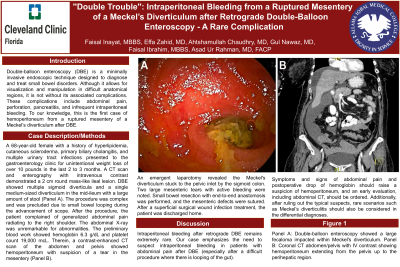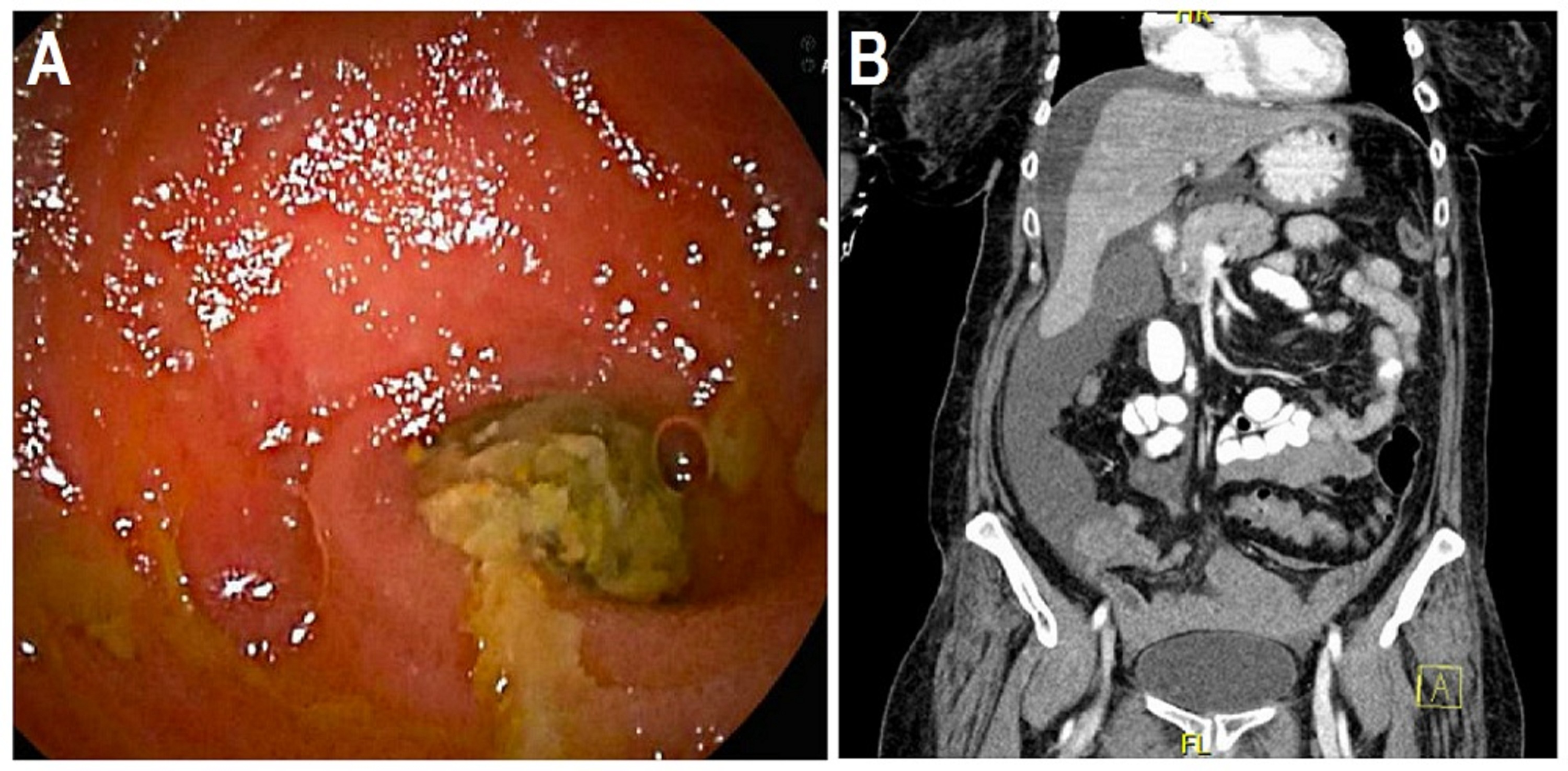Monday Poster Session
Category: General Endoscopy
P2419 - Double Trouble: Intraperitoneal Bleeding From a Ruptured Mesentery of a Meckel’s Diverticulum After Retrograde Double-Balloon Enteroscopy - A Rare Complication
Monday, October 28, 2024
10:30 AM - 4:00 PM ET
Location: Exhibit Hall E

Has Audio
- AC
Ahtshamullah Chaudhry, MD
St. Dominic's Hospital
Jackson, MS
Presenting Author(s)
Faisal Inayat, MBBS1, Effa Zahid, MD2, Ahtshamullah Chaudhry, MD3, Gul Nawaz, MD4, Faisal Ibrahim, MBBS5, Asad Ur Rahman, MD2
1Allama Iqbal Medical College, Lahore, Punjab, Pakistan; 2Cleveland Clinic Florida, Weston, FL; 3St. Dominic's Hospital, Jackson, MS; 4Marshfield Medical Center, Marshfield, WI; 5Wexham Park Hospital, Slough, England, United Kingdom
Introduction: Double-balloon enteroscopy (DBE) is a minimally invasive endoscopic technique designed to diagnose and treat small bowel disorders. Although it allows for visualization and manipulation in difficult anatomical regions, it is not without its associated complications. These complications include abdominal pain, perforation, pancreatitis, and infrequent intraperitoneal bleeding. To our knowledge, this is the first case of hemoperitoneum from a ruptured mesentery of a Meckel’s diverticulum after DBE.
Case Description/Methods: A 68-year-old female with a history of hyperlipidemia, cutaneous scleroderma, primary biliary cholangitis, and multiple urinary tract infections presented to the gastroenterology clinic for unintentional weight loss of over 10 pounds in the last 2 to 3 months. A CT scan and enterography with intravenous contrast demonstrated a 2 cm round mass-like ileal lesion. DBE showed multiple sigmoid diverticula and a single medium-sized diverticulum in the mid-ileum with a large amount of stool (Panel A). The procedure was complex and was precluded due to small bowel looping during the advancement of scope. After the procedure, the patient complained of generalized abdominal pain radiating to the right shoulder. The abdominal X-ray was unremarkable for abnormalities. The preliminary blood work showed hemoglobin 6.3 g/dL and platelet count 19,000 mcL. Therein, a contrast-enhanced CT scan of the abdomen and pelvis showed hemoperitoneum with suspicion of a tear in the mesentery (Panel B). An emergent laparotomy revealed the Meckel's diverticulum stuck to the pelvic inlet by the sigmoid colon. Two large mesenteric tears with active bleeding were noted. Small bowel resection with end-to-end anastomosis was performed, and the mesenteric defects were sutured. After a superficial surgical wound infection treatment, the patient was discharged home.
Discussion: Intraperitoneal bleeding after retrograde DBE remains extremely rare. Our case emphasizes the need to suspect intraperitoneal bleeding in patients with abdominal pain after DBE (especially after a difficult procedure where there is looping of the gut). Symptoms and signs of abdominal pain and postoperative drop of hemoglobin should raise a suspicion of hemoperitoneum, and an early evaluation, including abdominal CT, should be ordered. Additionally, after ruling out the typical suspects, rare scenarios such as Meckel’s diverticulitis should also be considered in the differential diagnoses.

Disclosures:
Faisal Inayat, MBBS1, Effa Zahid, MD2, Ahtshamullah Chaudhry, MD3, Gul Nawaz, MD4, Faisal Ibrahim, MBBS5, Asad Ur Rahman, MD2. P2419 - Double Trouble: Intraperitoneal Bleeding From a Ruptured Mesentery of a Meckel’s Diverticulum After Retrograde Double-Balloon Enteroscopy - A Rare Complication, ACG 2024 Annual Scientific Meeting Abstracts. Philadelphia, PA: American College of Gastroenterology.
1Allama Iqbal Medical College, Lahore, Punjab, Pakistan; 2Cleveland Clinic Florida, Weston, FL; 3St. Dominic's Hospital, Jackson, MS; 4Marshfield Medical Center, Marshfield, WI; 5Wexham Park Hospital, Slough, England, United Kingdom
Introduction: Double-balloon enteroscopy (DBE) is a minimally invasive endoscopic technique designed to diagnose and treat small bowel disorders. Although it allows for visualization and manipulation in difficult anatomical regions, it is not without its associated complications. These complications include abdominal pain, perforation, pancreatitis, and infrequent intraperitoneal bleeding. To our knowledge, this is the first case of hemoperitoneum from a ruptured mesentery of a Meckel’s diverticulum after DBE.
Case Description/Methods: A 68-year-old female with a history of hyperlipidemia, cutaneous scleroderma, primary biliary cholangitis, and multiple urinary tract infections presented to the gastroenterology clinic for unintentional weight loss of over 10 pounds in the last 2 to 3 months. A CT scan and enterography with intravenous contrast demonstrated a 2 cm round mass-like ileal lesion. DBE showed multiple sigmoid diverticula and a single medium-sized diverticulum in the mid-ileum with a large amount of stool (Panel A). The procedure was complex and was precluded due to small bowel looping during the advancement of scope. After the procedure, the patient complained of generalized abdominal pain radiating to the right shoulder. The abdominal X-ray was unremarkable for abnormalities. The preliminary blood work showed hemoglobin 6.3 g/dL and platelet count 19,000 mcL. Therein, a contrast-enhanced CT scan of the abdomen and pelvis showed hemoperitoneum with suspicion of a tear in the mesentery (Panel B). An emergent laparotomy revealed the Meckel's diverticulum stuck to the pelvic inlet by the sigmoid colon. Two large mesenteric tears with active bleeding were noted. Small bowel resection with end-to-end anastomosis was performed, and the mesenteric defects were sutured. After a superficial surgical wound infection treatment, the patient was discharged home.
Discussion: Intraperitoneal bleeding after retrograde DBE remains extremely rare. Our case emphasizes the need to suspect intraperitoneal bleeding in patients with abdominal pain after DBE (especially after a difficult procedure where there is looping of the gut). Symptoms and signs of abdominal pain and postoperative drop of hemoglobin should raise a suspicion of hemoperitoneum, and an early evaluation, including abdominal CT, should be ordered. Additionally, after ruling out the typical suspects, rare scenarios such as Meckel’s diverticulitis should also be considered in the differential diagnoses.

Figure: Figure 1. Panel A: Double-balloon enteroscopy showed a large fecaloma impacted within Meckel's diverticulum. Panel B: Coronal CT abdomen/pelvis with IV contrast showing hemoperitoneum extending from the pelvis up to the perihepatic region.
Disclosures:
Faisal Inayat indicated no relevant financial relationships.
Effa Zahid indicated no relevant financial relationships.
Ahtshamullah Chaudhry indicated no relevant financial relationships.
Gul Nawaz indicated no relevant financial relationships.
Faisal Ibrahim indicated no relevant financial relationships.
Asad Ur Rahman: Abbvie – Speakers Bureau.
Faisal Inayat, MBBS1, Effa Zahid, MD2, Ahtshamullah Chaudhry, MD3, Gul Nawaz, MD4, Faisal Ibrahim, MBBS5, Asad Ur Rahman, MD2. P2419 - Double Trouble: Intraperitoneal Bleeding From a Ruptured Mesentery of a Meckel’s Diverticulum After Retrograde Double-Balloon Enteroscopy - A Rare Complication, ACG 2024 Annual Scientific Meeting Abstracts. Philadelphia, PA: American College of Gastroenterology.
